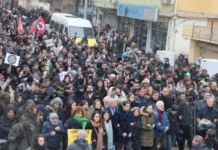Twenty-three people were briefly detained on Saturday due to the Kurdish songs played at a wedding that took place in central Turkey about a month and a half ago, Turkish Minute reported on Monday, citing the Gazete Duvar news website.
According to Perihan Koca, an MP from the pro-Kurdish Peoples’ Equality and Democracy Party (HEDEP), the detention of 23 people took place following raids on their houses on Saturday, more than a month after the wedding held in the Odunpazarı district of Eskişehir province.
The people were detained on accusations of “spreading propaganda for a terrorist organization,” the outlawed Kurdistan Workers’ Party (PKK), which is recognized as a terrorist organization by Turkey and much of the international community. They were released from detention after testifying to a prosecutor.
The MP said the wedding hall was also raided, with police confiscating the records of the wedding.
Koca likened the events to a wedding scene in the movie “Beynelmilel” (The International) directed in 2006 by HEDEP İstanbul lawmaker Sırrı Süreyya Önder, where one of the musicians asked to play a Kurdish song takes out a list of banned songs from his pocket and says the song is among them. Following the insistence, a silent version of the song is played.
“Those detained are well aware of the meaning of [the songs in] their own language. However, law enforcement authorities make them sing the songs in Turkish, declaring that they actually include a criminal element. … Singing songs related to your own language at a wedding, celebrating, having fun and preserving your own culture are considered crimes [in Turkey]. … This is a policy of suppression,” the lawmaker said.
Kurds in Turkey are often pressured not to speak their native language. Authorities frequently claim that people speaking in Kurdish are actually chanting slogans in support of the outlawed Kurdistan Workers’ Party (PKK), which has been leading an armed insurgency against Turkey’s security forces since the ’80s in a campaign that has claimed the lives of some 40,000 people.
Turkish authorities have increasingly restricted the use of Kurdish in recent years. Hate crimes against Kurds for speaking their language have also increased.
Prohibitions against the use of Kurdish in Turkey go back many years. Kurdish language, clothing, folklore and names had been banned since 1937. The words “Kurds,” “Kurdistan” and “Kurdish” were among those officially prohibited. After a military coup in 1980, speaking Kurdish was officially forbidden even in private life.















